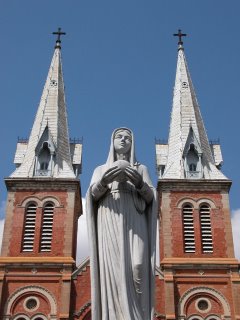
En route to my hotel on the first day here, the chauffeur showed me some people who stood in front of the statue of the Virgin Mary, located directly in front of the Notre Dame Cathedral. There was a miracle, he said. The statue was crying. For days now, believers and plain gawkers have been flocking to the area to witness the shedding of the tear by the stone icon. It would have been difficult on that night to discern the difference between the tears and the drizzles that sprinkled from heaven.
I asked some locals, most of whom misinformed me that there were two religious camps in Vietnam: 50% Buddhism and 50% Catholics. Further reading shed better understanding on this topic: there are a handful of religions instead: Confucianism, Taoism, Buddhism (predominantly Mahayana, as opposed to Theravada or Hinayana Buddhism), and Christianity. The first three, along with Vietnamese animism (the belief that the material world possesses souls) combine to form the Tam Giao (Triple Religion). Catholicism in Vietnam, beginning around the 16th century, is today practised by 8-10% of the population. There are also Cao Daism (a religious sect that fuses the secular and religious beliefs of the East and the West), Hoa Hao Buddhism, Islam, and Hinduism. I was also informed that, unlike in China, communism in Vietnam did not eradicate the esixtence of any form of religion.
While driving across the United States might yield plenty of Flamingo and Gnome sightings on people's lawns and frontyards, driving through the countrysides of Vietnam produced a curious view: statues of either standing female manifestation of the Buddha, or of the Virgin Mary, or of Christ the Redeemer, all of whom occupied the second-story balconies of the people's two or three-story homes. Seen from outside, these figures (especially of the Virgin and Christ) seemed to welcome you into the owners' homes. Perhaps that was indeed the intention. I remember wondering if there was a sense of competition inter- and intra-religion (i.e.: Buddhism vs. Catholicism; the cult of Mary vs. the cult of Jesus Christ).
***
On an unrelated note, I also observed that during a trip to Nha Trang from Saigon (an arduous 9+ hour bus/van ride; mon Dieu I will take a plane ride next time . . . if there is a next time!) the existence of plenty of graveyards; or at least what I originally thought was formal graveyards, until someone explained to me that soldiers who died during the War were buried immediately and at the site where they had fallen.
The road between Saigon and Nha Trang was the same route used by the North to advance to the South, the very same area where the South positioned its defense. Rather than moving these makeshift burials to a designated formal graveyard or a military gravesite, the soldiers' families returned to the site and built upon the makeshift burial. As a result, the landscape along the route was dotted with mounds after mounds of memorials to the fallen ones.
I thought this was a more effective and constant reminder to any passers-by of the toll any war can take. Gathering the fallen soldiers in one formal site and honoring them would have been a solemn gesture, but leaving them where they fell across miles and miles of a major highway would hopefully persuade passers-by to reflect on their sacrifices.
***
During that same road trip, I was also amazed by the existence of many Internet kiosks. In the seemingly most remote village where I did not think electricity existed, there appeared kiosk after kiosk of Internet access. Word had it that Vietnamese who fled the country in 1975 and had returned back to Vietnam either to visit their relatives or to repatriate had decided to bridge the digital gap and to make modest amount of money in the process. That reminded me of the speed at which a Vietnamese friend of mine in Los Angeles travelled to get his hands into this burgeoning and blossoming market that was Vietnam.